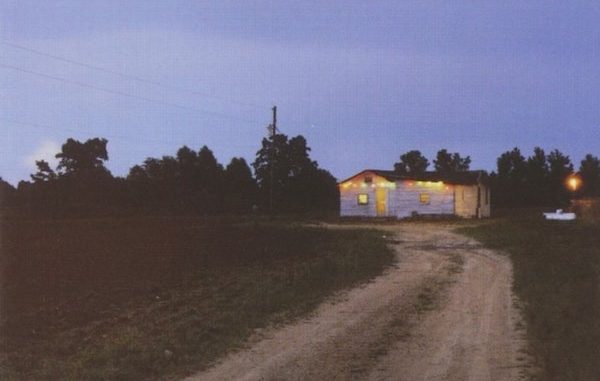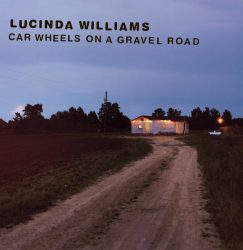
 In 1998 when ‘Car Wheels on a Gravel Road’ was released my musical tastes were much more rock-oriented and my gradual assimilation into all things Americana was really just beginning and I paid it scant attention at the time. That all changed though in late June of 2002. I’d bought and was hugely enjoying Williams’ next album ‘Essence‘ and faced with a 350-mile drive from Chicago, where I lived at the time, to a friend’s summer lake house in northern Wisconsin, I’d splashed out on some more CD’s (for those old enough to remember them) and of course one of them was ‘Car Wheels on a Gravel Road‘.
In 1998 when ‘Car Wheels on a Gravel Road’ was released my musical tastes were much more rock-oriented and my gradual assimilation into all things Americana was really just beginning and I paid it scant attention at the time. That all changed though in late June of 2002. I’d bought and was hugely enjoying Williams’ next album ‘Essence‘ and faced with a 350-mile drive from Chicago, where I lived at the time, to a friend’s summer lake house in northern Wisconsin, I’d splashed out on some more CD’s (for those old enough to remember them) and of course one of them was ‘Car Wheels on a Gravel Road‘.
Some 6 hours and multiple plays later (much to the chagrin of my two pre-teenage kids strapped in the back seat) every track and every lyric was pretty well etched into my brain. I loved the characters, I loved the storytelling, I loved the unusual melodies and I loved Williams curious vocal style and I immediately knew it was an album that I’d return to time and time again in the years to come. Of course, at that point, I had no idea of the background to the record and the near-legendary backstory that surrounds it.
Lucinda Williams was born in January of 1953 and spent her formative years constantly on the move. Her late father, Miller Williams, was a poet and college professor and the family lived in various southern towns and states as well as spells spent in Mexico and Chile. The rebellious streak had taken root inside Williams from a young age and, among other teenage misdemeanours, she was expelled from high school, reportedly for refusing to stand for the Pledge of Allegiance in protest against the war in Vietnam. Inspired in part by a list of 100 great books to read given to her by her civil rights activist dad, she became most influenced by Mary Flannery O’Connor whose penchant for southern, itinerant, morally flawed and offbeat characters is often reflected in Williams’ own writing style.
She had left home at 18 determined to make her way in a music world that was at odds with everything she stood for. Her idiosyncratic music and darkly painted landscapes left her in an empty musical hinterland somewhere between country and rock’n’roll but fitting into neither. This was at a time where what we know today as Alt-Country or Americana didn’t get broad exposure and almost certainly not for a female singer (it’s hard enough today but that’s a subject for another time!).
Listening to her music, it doesn’t take a great leap of imagination to realise that Dylan was her biggest influence. She told the Journal of Country Music that ‘Highway 61 Revisited‘ was the album which set her future direction. “That was it for me. I had somehow found the combination, the link of heavy, intense, brave lyrics — he’d obviously listened to a lot of blues — great melodies, and a voice that wasn’t perfect.”
Aside from the often deeply dark lyrics, Williams’ voice is reminiscent of Dylan’s. It’s wonderfully flawed, she doesn’t have a huge range, although she does have plenty of power to call on when needed, and again in her JCM interview, she confessed “I’ve always had an awareness of my voice being distinct. A lot of the time I feel kind of limited vocally. I can hear it in my head, but I can’t pull it off. I’m restricted because of my range. I just don’t have that kind of voice, that kind of range — you know, like even Emmy has, or like Joni Mitchell. When I first started out those were the voices I wanted to sound like. Eventually, though, you have to come to terms with your limitations, which, in turn, become your trademark.”
Her first couple of albums, ‘Ramblin’ and ‘Happy Woman Blues’ didn’t garner much attention but after signing for Rough Trade Records (who also had Stiff Little Fingers and Leadbelly on their books) she released the outstanding self-titled ‘Lucinda Williams’ which gained her the first real acclaim and exposure of her career. With the single ‘Changed the Locks’ gaining airplay around the US, she built a fanbase that included the late Tom Petty who later covered the song on the ‘She The One’ soundtrack album (from the movie of the same name). In true Williams style, it then took four years before her fourth album ‘Sweet Old World’ arrived and she had already gained a reputation for very methodical (that’s being somewhat charitable) in the studio.
This is where that near-legendary backstory starts. There are numerous reports surrounding the six-year gap between 1992’s ‘Sweet Old World’ and the release of ‘Car Wheels‘ in 1998 with some accounts suggesting three or even four failed attempts in multiple cities to record, produce and mix the final version. In all likelihood, it appears that there were two years in the studio (1995-97) as Williams and Co-Producer Gurf Morlix made the first attempt but with Williams, apparently very unhappy with what she perceived to be a “flat, lifeless” effort that sounded too much like ‘Sweet Old World‘ she started from scratch with Steve Earle (who incidentally said it was “the least amount of fun I’ve had working on a record.” (although they are good friends these days) and Ray Kennedy before finishing the album in LA with Roy Bittan. There you have it, three years, four producers and three different cities. It’s therefore, somewhat ironic to learn that throughout this whole epic journey, Williams was apparently searching for a “less produced” sound!
It’s also a little odd that an album which could easily double as a road map for America’s deep south – with songs featuring Baton Rouge, Lafayette Greenville and Lake Charles – resonates so much with fans, particularly international ones who, in most instances, have never set foot in that part of the US and who would have little clue where those towns are.
Geography aside, what matters most about ‘Car Wheels’ is the emotional journeys that Williams manages to portray with a series of stunning songs. Right out of the gate we get a taste of things to come with ‘Right in Time’ which paints a sensually vivid picture as Williams sultry voice sings about missing her absent love “The way you move is right in time. It’s right in time with me. I take off my watch and my earrings, my bracelets and everything. Lie on my back and moan at the ceiling. Oh my baby”.
From there we’re straight into the title track which immediately uses the southern road theme to great effect as Williams cleverly paints a bleak portrait of a character suffering through an extremely dull and repetitive life. It’s all done through a lyrical dexterity that never directly mentions that suffocating domestic situation as she manages to conjure up bleak images of the deep south with words like “Cotton fields stretching miles and miles/Hank’s voice on the radio.” Simple, but in the context of the rest of the song, pure genius.
The rest of the album continues to ride an emotional roller-coaster with ‘Drunken Angel’ being a stunningly beautiful eulogy for Texas outlaw country musician Blaze Foley who senselessly died in a shootout in 1989 and again Williams’ use of seemingly simple words and phrases allows her to bring the character and her sense of personal loss into sharp relief. She does so again in ‘Kool 2 Be 4-Gotten’ which ends up being another eulogy, this time for her ex-boyfriend Clyde Woodward while ‘Lake Charles’ also pays homage to her lex-lover as she sings “Did an angel whisper in your ear and hold you close and take away your fear in those long last moments?” Beautifully moving lyrics.
Previous albums had been high on praise from critics and fellow musicians but largely ignored by the public and the radio stations and as far back as 1995, Emmylou Harris said “Lucinda Williams should be at the very centre of country music. She is an example of the best of what country at least says it is. But, for some reason, she’s completely out of the loop. And I feel strongly that that’s country music’s loss.” That all changed with ‘Car Wheels’ which proved to be the breakout album for Williams and gained a Grammy award for Best Contemporary Folk Album.
Looking back and not having listened to the album for some time leaves me with mixed emotions. Beyond doubt is the strength and beauty of Lucinda Williams lyrics as she conjures up the imagery of life along those dusty, two-lane southern country highways. Blue-collar lives displaying the entire range of human emotion and all sung with that beautifully imperfect voice but I can’t help but wonder what might have been if some of the music was just a bit more raw and just a little a bit less perfect and dare I say it, a bit less produced? That’s nit-picking of the highest order though, it was and still is a work of pure genius.




Went to see Lucinda at the Barbican (having got lost getting there needless to say). Apparently her dad realised the title song was about him well after its release. The song about Lake Charles was about her then partner “who never stopped talking about it (the lake)”. She still wasn’t 100% but gave it a mighty effort. Still a great album.
A fantastic album, the second I got after Lucinda Williams (which also has its share of classic tracks). Seen her twice, first time at a small, intimate solo gig in Aberdare, South Wales, and the second time when she played the whole of Car Wheels, with full band in Bristol. a couple years before her stroke. The gig was simply sublime.